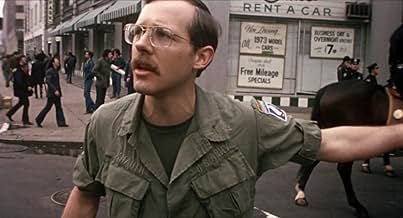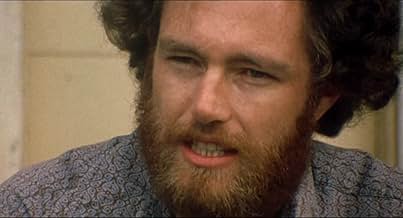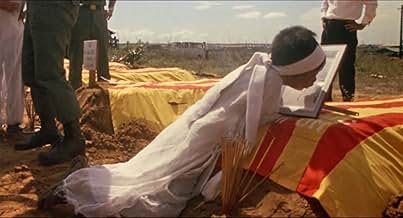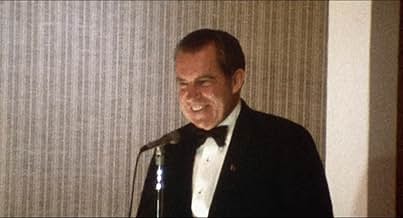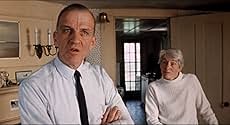NOTE IMDb
8,2/10
6,5 k
MA NOTE
Ajouter une intrigue dans votre langueA startling and courageous landmark documentary that unflinchingly confronted the United States' involvement in Vietnam at the height of the controversy that surrounded it.A startling and courageous landmark documentary that unflinchingly confronted the United States' involvement in Vietnam at the height of the controversy that surrounded it.A startling and courageous landmark documentary that unflinchingly confronted the United States' involvement in Vietnam at the height of the controversy that surrounded it.
- Récompensé par 1 Oscar
- 5 victoires et 1 nomination au total
Ngo Dinh Diem
- Self - President of South Vietnam
- (images d'archives)
John Foster Dulles
- Self - Secretary of State, 1953-1959
- (images d'archives)
Kay Dvorshock
- Self
- (images d'archives)
Dwight D. Eisenhower
- Self - President of the United States
- (images d'archives)
Lyndon B. Johnson
- Self
- (images d'archives)
- (as Lyndon Johnson)
John F. Kennedy
- Self - President of the United States
- (images d'archives)
Robert F. Kennedy
- Self - U.S. Senator
- (images d'archives)
William Marshall
- Self
- (as Sgt. WIlliam Marshall - Detroit)
Eugene McCarthy
- Self - U.S. Senator
- (images d'archives)
Ho Chí Minh
- Self
- (images d'archives)
Avis à la une
Davis does a neat job of laying out the absurdity in the US's involvement in Vietnam. He does it mainly through the use of two techniques.
(1) Successive contrast, as it's called in the psychology of perception. If you stare at a black square for a while, then switch your gaze to a gray square, it looks white, not gray. In this movie Davis juxtaposes moments from interviews and newsreel footage to demonstrate how far removed high-level speeches can be from events as they take place on the ground. General Westmoreland, who, like General Douglas MacArthur, was another one of those giants in the field of Oriental psychology, explains to us that Asians don't place the same kind of value on human life as Westerners do. (He might have been thinking of kamikaze attacks from WWII.) Cut to a Vietnamese funeral full of wailing mourners. A coach gives a pep talk, screaming and weeping, to a high school football team in Niles, Ohio. "Don't let them BEAT US!" he cries. Cut to a scene of combat.
(2) Selective interviewing and editing. The Vietnamese seem to speak nothing but common sense and they are seen doing nothing but defending themselves -- and very little of that. The Americans that we see and hear are mostly divided into two types: phony idiots and wised-up ex-patriot veterans. Fred Coker is an exception. He's a naval aviator who was evidently a POW. He's clean-cut, intelligent, and articulate, and he's given a lot of screen time. This is all for the good because he's about the only pro-war character we see. He's been there and he still believes. He serves as a useful bridge between the pro-war idiots and the embittered anti-war Americans.
And of course the statements we hear on screen are selected for their dramatic value. One former pilot describes how he and his comrades approached their bombing missions -- for some of them it was just a job, part of the daily grind, but for some others it got to be kind of fun. And for him? "I enjoyed it." The amazing thing in propagandistic documentaries like this is not that the sound bites were selected. Of course they were, otherwise you'd have a dull movie of a thousand people from the middle of the road. "Dog bites man" is not news. "Man bites dog" IS news! No, the truly astonishing thing is that some of the interviewees actually SAID these things in the first place. Selective or not, here is the evidence on film. And how is it possible to "take out of context" General Westmoreland's disquisition on the Oriental attitude towards life? Or a vet smirking and saying he enjoyed killing Gooks?
I'm reminded of a scene in Michael Moore's first documentary, "Roger and Me." Moore is talking to a handful of rich wives who are on some Flint, Michigan, golf course, chipping balls. His camera rolls on and on while the ladies chat about the closing of the plants and the movement of jobs to cheaper labor markets. They love the area around Flint -- great golf courses, good riding country. And the newly unemployed? Well, says one of the wives, before a swing, now they'll have to get up and find a job. Poor people are always lazy anyway.
It's a shocking statement, and we hear similarly shocking statements throughout this movie. It all leaves a viewer with a sense of awe that anyone could be so unashamedly deluded.
I don't see any reason to point out the similarities between what happened in Viet Nam and what's going on as I write this. I wish our current leaders, practically none of whom served in the military let alone Viet Nam, could have seen this because it might have served as a useful reminder that war isn't REALLY very much like a high school football game.
G. K. Chesterton once wrote, "My country, right or wrong, is a thing no true patriot would think of saying. It is like saying, 'My mother, drunk or sober'".
(1) Successive contrast, as it's called in the psychology of perception. If you stare at a black square for a while, then switch your gaze to a gray square, it looks white, not gray. In this movie Davis juxtaposes moments from interviews and newsreel footage to demonstrate how far removed high-level speeches can be from events as they take place on the ground. General Westmoreland, who, like General Douglas MacArthur, was another one of those giants in the field of Oriental psychology, explains to us that Asians don't place the same kind of value on human life as Westerners do. (He might have been thinking of kamikaze attacks from WWII.) Cut to a Vietnamese funeral full of wailing mourners. A coach gives a pep talk, screaming and weeping, to a high school football team in Niles, Ohio. "Don't let them BEAT US!" he cries. Cut to a scene of combat.
(2) Selective interviewing and editing. The Vietnamese seem to speak nothing but common sense and they are seen doing nothing but defending themselves -- and very little of that. The Americans that we see and hear are mostly divided into two types: phony idiots and wised-up ex-patriot veterans. Fred Coker is an exception. He's a naval aviator who was evidently a POW. He's clean-cut, intelligent, and articulate, and he's given a lot of screen time. This is all for the good because he's about the only pro-war character we see. He's been there and he still believes. He serves as a useful bridge between the pro-war idiots and the embittered anti-war Americans.
And of course the statements we hear on screen are selected for their dramatic value. One former pilot describes how he and his comrades approached their bombing missions -- for some of them it was just a job, part of the daily grind, but for some others it got to be kind of fun. And for him? "I enjoyed it." The amazing thing in propagandistic documentaries like this is not that the sound bites were selected. Of course they were, otherwise you'd have a dull movie of a thousand people from the middle of the road. "Dog bites man" is not news. "Man bites dog" IS news! No, the truly astonishing thing is that some of the interviewees actually SAID these things in the first place. Selective or not, here is the evidence on film. And how is it possible to "take out of context" General Westmoreland's disquisition on the Oriental attitude towards life? Or a vet smirking and saying he enjoyed killing Gooks?
I'm reminded of a scene in Michael Moore's first documentary, "Roger and Me." Moore is talking to a handful of rich wives who are on some Flint, Michigan, golf course, chipping balls. His camera rolls on and on while the ladies chat about the closing of the plants and the movement of jobs to cheaper labor markets. They love the area around Flint -- great golf courses, good riding country. And the newly unemployed? Well, says one of the wives, before a swing, now they'll have to get up and find a job. Poor people are always lazy anyway.
It's a shocking statement, and we hear similarly shocking statements throughout this movie. It all leaves a viewer with a sense of awe that anyone could be so unashamedly deluded.
I don't see any reason to point out the similarities between what happened in Viet Nam and what's going on as I write this. I wish our current leaders, practically none of whom served in the military let alone Viet Nam, could have seen this because it might have served as a useful reminder that war isn't REALLY very much like a high school football game.
G. K. Chesterton once wrote, "My country, right or wrong, is a thing no true patriot would think of saying. It is like saying, 'My mother, drunk or sober'".
A documentary of the conflicting attitudes of the opponents of the Vietnam war.
Roger Ebert wrote, "Here is a documentary about Vietnam that doesn't really level with us... If we know something about how footage is obtained and how editing can make points, it sometimes looks like propaganda... And yet, in scene after scene, the raw material itself is so devastating that it brushes the tricks aside." Exactly right. The folks who made this are clearly anti-war, but some of the footage they get is unforgettable.
Most notably is the interview with General William Westmoreland where he says, "The Oriental doesn't put the same high price on life as does a Westerner. Life is plentiful. Life is cheap in the Orient." How can that be interpreted any other way?
The movie was chosen as Academy Award for Best Documentary Feature at the 47th Academy Awards presented in 1975. This win was not only well-deserved, but opened the door for possibly an even better Vietnam documentary: Errol Morris' "The Fog of War: Eleven Lessons from the Life of Robert S. McNamara" (2003), which also won the Oscar.
Roger Ebert wrote, "Here is a documentary about Vietnam that doesn't really level with us... If we know something about how footage is obtained and how editing can make points, it sometimes looks like propaganda... And yet, in scene after scene, the raw material itself is so devastating that it brushes the tricks aside." Exactly right. The folks who made this are clearly anti-war, but some of the footage they get is unforgettable.
Most notably is the interview with General William Westmoreland where he says, "The Oriental doesn't put the same high price on life as does a Westerner. Life is plentiful. Life is cheap in the Orient." How can that be interpreted any other way?
The movie was chosen as Academy Award for Best Documentary Feature at the 47th Academy Awards presented in 1975. This win was not only well-deserved, but opened the door for possibly an even better Vietnam documentary: Errol Morris' "The Fog of War: Eleven Lessons from the Life of Robert S. McNamara" (2003), which also won the Oscar.
Hard hitting documentary directed by Peter Davis in how the US got itself involved in the War in Vietnam that ended up tearing the country apart. Made in 1974 before the Vetcong guerrillas and North Vietnamese Army overran the country the film shows the pitfalls that the US chose to overlook in getting itself stuck in the mud swamps and jungles that was the Vietnam War.
There's really no one US President to blame for getting the country into that bloody mess of a war in that we see it was a team effort from Pres. Truman to Pres. Nixon and every other US Chief Executive, Eisenhower Kennedy & Johnson, in between. The French who were involved in the first Vietnam or Indochina War was soundly defeated by Ho Chi Minh's, known as "The Enlighten One", Viet Minh forces in the bloody and drawn out battle of Dien Bien Phu in May 1954. That jungle battle ended the conflict that resulted in the loss, French and Vietnames military and civilians, of over 700,000 lives. During the almost 8 years of of fighting in Indochina War the US was far from neutral in supporting the French with almost 80% of the arms and money for the French to keep the war going.
With the free and UN sponsored elections to unify both north and South Vietnam set to be held in 1956 and Ho Chi Minh being a sure shot of winning them the US under Pres. Eisenhower set up the puppet Diem to be South Vietnam's fist unelected president. This set the stage for the second Vietnam War that was to involved as much as 550,000 US troops and lasting 16 years from 1959 to 1975, the longest war in US history, ending up costing almost 60,000 American lives; Not to mention the some 3 million Vietnamese,from both North & South Vietnam, who perished in it.
Among the many persons who were personally involved in the Vietnam war the one who made the biggest impact on me in the movie was former Secretary of Defense Clark Clifford. Clifford in an interview admitted that those Generals and politicians conducting the war had no idea in not only how to win it but who they were fighting against. Everything that they did failed miserably and they ended up stuck in an unwindable war because in their mind by ending it, or withdrawing from the country, would lead to a "Domino Effect" where all of South-East Asia would end up falling into Communists hands. Which to them was worth the enormous loss of life, American & Vietnamese, that this bottomless quagmire of a war was was costing! As it turned out the "Domino Effect" turned out to be pure fiction with no other country in that part of the world turning Communist and Vietnam now a united country being one of the US', next to Communist China, biggest trading partners in Asia!
What the film brings out best is how most of the American public finally realized that they've been had in going along with the bankrupt policies of their leaders who conned them, like in the faked and infamous Tonkin Gulf incident, into supporting the war. Taking to the street in massive anti-war demonstrations with hundreds of returning Vietnam war vet participating in them was what really brought the war to an end. But it took almost 6 years from 1966 to 1973 for it to happen! And it was during that time the majority of the almost 60,000 American and 3 million Vietnamese lives lost in the war were snuffed out.
In the end the Vietnam War turned out to be a war that many from the Truman Eishenhower Kenndey Johnson & Nixon Administrations who whole hearted supported it at first would now, after all the facts are in about it, like to forget!
There's really no one US President to blame for getting the country into that bloody mess of a war in that we see it was a team effort from Pres. Truman to Pres. Nixon and every other US Chief Executive, Eisenhower Kennedy & Johnson, in between. The French who were involved in the first Vietnam or Indochina War was soundly defeated by Ho Chi Minh's, known as "The Enlighten One", Viet Minh forces in the bloody and drawn out battle of Dien Bien Phu in May 1954. That jungle battle ended the conflict that resulted in the loss, French and Vietnames military and civilians, of over 700,000 lives. During the almost 8 years of of fighting in Indochina War the US was far from neutral in supporting the French with almost 80% of the arms and money for the French to keep the war going.
With the free and UN sponsored elections to unify both north and South Vietnam set to be held in 1956 and Ho Chi Minh being a sure shot of winning them the US under Pres. Eisenhower set up the puppet Diem to be South Vietnam's fist unelected president. This set the stage for the second Vietnam War that was to involved as much as 550,000 US troops and lasting 16 years from 1959 to 1975, the longest war in US history, ending up costing almost 60,000 American lives; Not to mention the some 3 million Vietnamese,from both North & South Vietnam, who perished in it.
Among the many persons who were personally involved in the Vietnam war the one who made the biggest impact on me in the movie was former Secretary of Defense Clark Clifford. Clifford in an interview admitted that those Generals and politicians conducting the war had no idea in not only how to win it but who they were fighting against. Everything that they did failed miserably and they ended up stuck in an unwindable war because in their mind by ending it, or withdrawing from the country, would lead to a "Domino Effect" where all of South-East Asia would end up falling into Communists hands. Which to them was worth the enormous loss of life, American & Vietnamese, that this bottomless quagmire of a war was was costing! As it turned out the "Domino Effect" turned out to be pure fiction with no other country in that part of the world turning Communist and Vietnam now a united country being one of the US', next to Communist China, biggest trading partners in Asia!
What the film brings out best is how most of the American public finally realized that they've been had in going along with the bankrupt policies of their leaders who conned them, like in the faked and infamous Tonkin Gulf incident, into supporting the war. Taking to the street in massive anti-war demonstrations with hundreds of returning Vietnam war vet participating in them was what really brought the war to an end. But it took almost 6 years from 1966 to 1973 for it to happen! And it was during that time the majority of the almost 60,000 American and 3 million Vietnamese lives lost in the war were snuffed out.
In the end the Vietnam War turned out to be a war that many from the Truman Eishenhower Kenndey Johnson & Nixon Administrations who whole hearted supported it at first would now, after all the facts are in about it, like to forget!
There are certain subjects so horrendous and so important that fictionalizing them, regardless of the good intentions of the film maker, can only trivialize them. "Schindler's List", "JFK" and "The Deer Hunter" come to mind.
Give me a good documentary any time, and this is one of the best.
It takes the silly rhetoric of our leaders and juxtaposes it with images showing the horrendous results of their short-sighted policies.
If you want to know what the VietNam war was really all about, (and why so many of us were against it,) skip "Apocalypse Now", "Go Tell the Spartans" and "Full Metal Jacket" and watch this one.
Give me a good documentary any time, and this is one of the best.
It takes the silly rhetoric of our leaders and juxtaposes it with images showing the horrendous results of their short-sighted policies.
If you want to know what the VietNam war was really all about, (and why so many of us were against it,) skip "Apocalypse Now", "Go Tell the Spartans" and "Full Metal Jacket" and watch this one.
Hearts and Minds holds much relevance for the post- Sept-11 world.
Although this film concerns itself with the Vietnam War, it is really about war in general. It explores the reasons America behaves the way it does towards other countries and towards itself, without having to come right out and tell you. It is the old writers credo, "Show, don't tell." The film bears multiple viewings, and you discover something new every time. Anybody who has loved ones in the military, and anybody who is "involved" in politics will be interested in watching this.
Although this film concerns itself with the Vietnam War, it is really about war in general. It explores the reasons America behaves the way it does towards other countries and towards itself, without having to come right out and tell you. It is the old writers credo, "Show, don't tell." The film bears multiple viewings, and you discover something new every time. Anybody who has loved ones in the military, and anybody who is "involved" in politics will be interested in watching this.
Le saviez-vous
- AnecdotesThe main people to turn down Peter Davis' request to be interviewed were Henry Kissinger, Richard Nixon, and Robert McNamara.
- Citations
Daniel Ellsberg: The question used to be: might it be possible that we were on the wrong side in the Vietnamese War? But, we weren't on the wrong side. We are the wrong side.
- Crédits fousThe listed translators credited in the movie (Le Thai To, Trung Trac, Le Thanh Tong and Trung Hung Dao) were all Vietnamese generals who had defeated the Chinese in various times from the first century C.E., to the fifteenth century C.E. The translator listed as Nguyen Ai Quoc was an early alias of Ho Chi Minh, founder of the Vietnamese Communist Party. I have no knowledge of the last listed translator, Barbara Gore. Apparently, someone played a good joke on the producers of this film, if it wasn't the translators themselves.
- ConnexionsFeatured in Sneak Previews: Take 2: Vietnam Movies (1980)
Meilleurs choix
Connectez-vous pour évaluer et suivre la liste de favoris afin de recevoir des recommandations personnalisées
- How long is Hearts and Minds?Alimenté par Alexa
Détails
- Date de sortie
- Pays d’origine
- Sites officiels
- Langues
- Aussi connu sous le nom de
- Hearts and Minds
- Lieux de tournage
- Sociétés de production
- Voir plus de crédits d'entreprise sur IMDbPro
Box-office
- Montant brut aux États-Unis et au Canada
- 28 754 $US
- Week-end de sortie aux États-Unis et au Canada
- 8 556 $US
- 24 oct. 2004
- Montant brut mondial
- 28 754 $US
Contribuer à cette page
Suggérer une modification ou ajouter du contenu manquant


